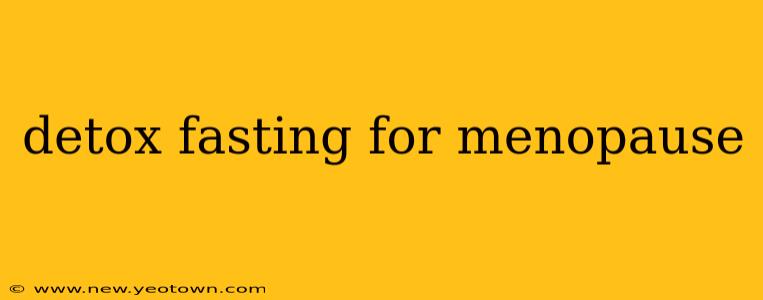Menopause. The word itself conjures up images of hot flashes, night sweats, mood swings, and weight gain. For many women, it's a challenging transition, marked by significant hormonal shifts that can impact every aspect of their lives. While hormone replacement therapy (HRT) is an option, many women are seeking gentler, more holistic approaches to navigate this phase. Enter detox fasting, a method gaining traction for its potential to support hormonal balance and overall well-being during menopause. But is it the right choice for you? Let's explore.
This isn't about crash dieting or extreme measures. Instead, think of detox fasting as a mindful approach to nourishing your body and supporting its natural detoxification processes during a time of significant change. It's about giving your system a break from the constant barrage of processed foods, environmental toxins, and stress that can exacerbate menopausal symptoms.
What is Detox Fasting?
Detox fasting, in the context of menopause, doesn't necessarily mean complete abstinence from food. It's more about strategically choosing what you eat, focusing on whole, unprocessed foods that support liver function and gut health—both crucial for detoxification. It involves reducing your intake of inflammatory foods like processed sugars, refined carbohydrates, and excessive amounts of caffeine and alcohol. Some women may incorporate intermittent fasting, where they cycle between periods of eating and voluntary fasting, while others might opt for a gentler approach, focusing on nutrient-dense meals and mindful eating practices. The key is to find a method that works for your body and lifestyle.
Does Detox Fasting Help with Menopausal Symptoms?
This is a complex question, and the answer isn't a simple yes or no. Scientific evidence specifically linking detox fasting to all menopausal symptoms is limited. However, the underlying principles—improving gut health, reducing inflammation, and supporting liver function—are strongly linked to overall well-being and may alleviate some symptoms.
For example, improved gut health can positively impact mood, which is often affected during menopause. Reducing inflammation can lessen hot flashes and night sweats. Supporting liver detoxification can help the body eliminate excess hormones and toxins more efficiently.
Remember, individual experiences vary greatly, and what works for one woman might not work for another.
Is Detox Fasting Safe During Menopause?
Safety is paramount. Before embarking on any detox fasting program, especially during menopause, it's crucial to consult your doctor or a registered dietitian. They can assess your individual health status, medication interactions, and potential risks. Certain pre-existing conditions may make detox fasting unsuitable.
What are the Potential Benefits of Detox Fasting for Menopause?
While more research is needed, many women report positive experiences with detox fasting during menopause, including:
- Improved energy levels: By focusing on nutrient-dense foods, you provide your body with the fuel it needs to function optimally.
- Better sleep quality: Reducing inflammation and improving gut health can contribute to better sleep.
- Reduced bloating and digestive issues: A focus on whole foods and eliminating inflammatory foods often improves gut function.
- Weight management: While not a guaranteed outcome, detox fasting, combined with regular exercise, can support healthy weight management.
- Improved mood and mental clarity: Reducing inflammation and improving gut health can positively impact mood and cognitive function.
What are the Potential Risks of Detox Fasting for Menopause?
While generally considered safe when approached correctly and under professional guidance, potential risks include:
- Nutrient deficiencies: Improperly planned detox fasting can lead to nutrient deficiencies.
- Headaches and fatigue: These are common initial side effects as your body adjusts.
- Muscle loss: Extreme calorie restriction can lead to muscle loss.
- Hormonal imbalance (if not done correctly): Restrictive dieting can potentially exacerbate existing hormonal imbalances.
What Foods are Good for Detoxing During Menopause?
Focus on whole, unprocessed foods that support your body's natural detoxification processes:
- Cruciferous vegetables: Broccoli, cauliflower, kale, Brussels sprouts support liver detoxification.
- Leafy greens: Spinach, kale, and collard greens are packed with nutrients.
- Berries: Rich in antioxidants.
- Avocado: Healthy fats support hormone production.
- Fatty fish: Rich in omega-3 fatty acids, which have anti-inflammatory properties.
- Legumes: Excellent source of fiber and plant-based protein.
How Can I Incorporate Detox Fasting into My Menopause Journey?
Start slowly and gradually incorporate changes into your diet. Listen to your body, and don't hesitate to adjust your plan as needed. Consider working with a registered dietitian or healthcare professional who specializes in women's health and menopause to create a personalized plan that aligns with your individual needs and goals. Remember that detox fasting is a supporting tool, not a miracle cure.
This journey is unique to each woman. Combining detox fasting with regular exercise, stress management techniques, and sufficient sleep is a holistic approach that can potentially alleviate menopausal symptoms and improve overall well-being. Always prioritize your health and seek professional guidance before making significant dietary changes.

